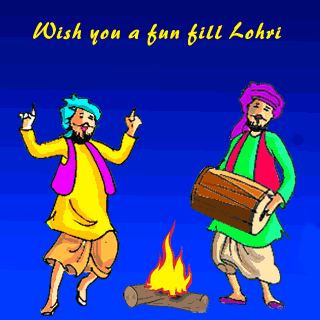ॐ सांई राम
Origin of Lohri

Lohri marks the end of winter on the last day of Paush, and beginning of Magha (around January 12 and 13), when the sun changes its course. It is associated with the worship of the sun and fire and is observed by all communities with different names, as Lohri is an exclusively Punjabi festival. The questions like When it began and why is lost in the mists of antiquity.
The origin of Lohri is related to the central character of most Lohri songs is Dulla Bhatti, a Muslim highway robber who lived in Punjab during the reign of Emperor Akbar. Besides robbing the rich, he rescued Hindu girls being forcibly taken to be sold in slave market of the Middle East. He arranged their marriages to Hindu boys with Hindu rituals and provided them with dowries. Understandably, though a bandit, he became a hero of all Punjabis. So every other Lohri song has words to express gratitude to Dulla Bhatti.
Some believe that Lohri has derived its name from Loi, the wife of Sant Kabir, for in rural Punjab Lohri is pronounced as Lohi. Others believe that Lohri comes from the word 'loh', a thick iron sheet tawa used for baking chapattis for community feasts. Another legend says that Holika and Lohri were sisters. While the former perished in the Holi fire, the latter survived. Eating of til (sesame seeds) and rorhi (jaggery) is considered to be essential on this day. Perhaps the words til and rorhi merged to become tilorhi, which eventually got shortened to Lohri.
Ceremonies that go with the festival of Lohri usually comprises of making a small image of the Lohri goddess with gobar (cattle dung), decorating it, kindling a fire beneath it and chanting its praises. The final ceremony is to light a large bonfire at sunset, toss sesame seeds, gur, sugar-candy and rewaries in it, sit round it, sing, dance till the fire dies out. People take dying embers of the fire to their homes. In Punjabi village homes, fire is kept going round the clock by use of cow-dung cakes.

